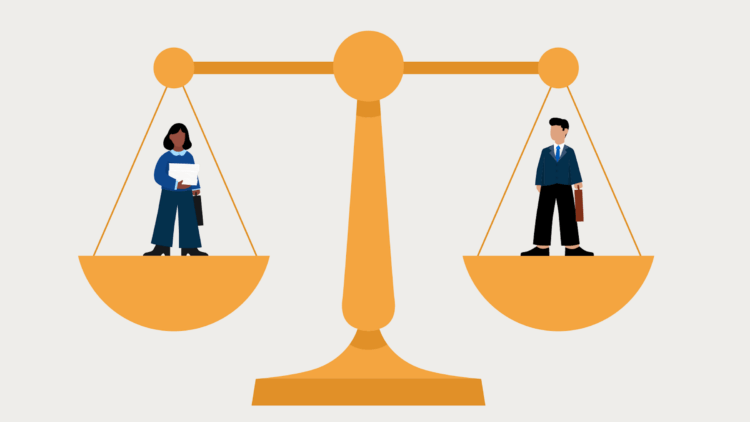How One Lawyer Practices While Traveling the Country in an RV
Is it really always possible to follow your dreams, even if those dreams involve taking on huge legal cases while traveling the country in an RV? For Crystal McDonough, owner of McDonough Law, the answer to that question is “yes.”
McDonough Law is based in Colorado, but they service clients in Colorado, Wyoming, and Nebraska—and that’s just for now. We spoke with Crystal at the 2019 Clio Cloud Conference about how she designed the life she wanted around a successful practice, and how other lawyers can do it too. This is also the subject of Crystal’s course, Law Adventure.
Teresa Matich:
So, officially, you’re based in Colorado. But you actually founded your law firm while traveling around the country in an RV. Can you tell us about that?
Crystal McDonough:
Yes, that is right. So I came to law a little bit later in life. I went to law school with three children. My youngest was three. They were three, five, and seven when I started law school.
So for me it was a challenge, to say the least, and so my husband and I determined that I would get through it as quickly as possible. The goal was to start a law firm and provide the flexibility and income that we needed for our family. All along we knew we wanted to travel and we wanted to experience as much as we could with our kids while we have our kids with us—because once they go off to college, they don’t want to hang out with mom and dad anymore. So I had this idea of traveling around the country in an RV and just exploring everything. Going to national parks, museums—anything we could see and experience. And we enjoy huge outdoor activities like mountain biking, kayaking, paddleboarding—anything we can do outside.
So once I graduated law school, I designed the firm around this concept of this flexible lifestyle and we bought an RV—a giant 40-foot fifth wheel—and took off and started exploring the country.
Teresa Matich:
Wow, that’s amazing. And what do people say when you tell them that that’s your life?
Crystal McDonough:
They’re very confused. They wonder, first of all, how I can work from the road. They want to know the logistics of, well, “How do you talk to your clients? How do you get your work done? How do you get paid? How do you …” There are all these questions that immediately come to their minds, but then the second comment is, “How cool! How do I do that?”
Teresa Matich:
So that’s cool. And you’re telling them exactly how to do that.
Crystal McDonough:
Yes. After about five years of getting phone calls, and emails, and Facebook messages from attorneys all over the country, I finally decided to go ahead and put my experiences into a book—not only to tell people about my experience, but also to help other attorneys achieve the same type of living the dream.
Teresa Matich:
That remains such a struggle for most attorneys. We know from previous Legal Trends Reports that such a high percentage of attorneys work outside of regular hours, and they say that it affects their mental health. So what do you think needs to change in the legal industry?
Crystal McDonough:
So, from my perspective, I think that it’s hard for attorneys, because you graduate from law school, you take the first job you can, and the jobs and your bosses and the path you take just kind of get defined for you—instead of you stepping back, defining your life and how you want it to be, and then designing that and then actually doing it.
Teresa Matich:
That’s so true. And what do your clients say about your law firm?
Crystal McDonough:
Most of our clients don’t even know that I travel.
Some of them do, and the ones that do think it’s really cool. And, in fact, I mean I’ve got clients all over the country. And so with some of our clients who’ve gotten to be friends, we’ll travel and we’ll go visit some of them in different locations. I’ve got a client in D.C., and we actually spent two weeks in D.C., staying at his flat in D.C. And it was a lot of fun. So a lot of our customers are business owners and they love the idea of flexibility. They understand the grind and they know that when you work hard you also need to play hard.
Teresa Matich:
So then what is your biggest challenge of running a remote law firm?
Crystal McDonough:
The biggest challenge was scalability. Because, when you’re a solo practitioner, it’s kind of easy. You run the show, you do all the work, you do everything. So if you take everything with you on the road and you travel or wherever you are, it doesn’t really matter. But when you start getting bigger than yourself, learning how to scale that and still maintain that lifestyle and that flexibility is the most challenging part.
It’s taken me years to refine it. You have to practice it. You have to continually work at it, because there are constantly new challenges. I mean, there are times when I have to miss the first leg of a trip because an emergency has come up and I’ve got to deal with it. Or there are times when I have to fly back from wherever my family is at the moment and deal with certain issues. So there are some tough things to overcome, but you can. You can certainly do it. It’s a matter of being creative and deliberate and just taking that step every day.
Teresa Matich:
It sounds like you can have that work-life balance, but it might not be exactly what you think it is. It might not be nine to five. You might have seasons of working very hard and seasons where you can take more trips, depending on how your business is going at your firm.
Crystal McDonough:
I actually find that I’m more productive when we’re on the road, because I don’t have as many distractions. When we’re on the road and we’re out in our RV, we live a simple life. We don’t have a lot of things around us. You have to be more purposeful with your day and your time. So without the distractions, I tend to get more work done, be more productive, and be more focused. When I’m in the office or when I’m at home working from my home office, there are all these distractions pulling at me constantly, all day, every day. So it’s an interesting experience when you do that, to see how it actually works.
Teresa Matich:
I guess you wouldn’t know until you’re in it.
Crystal McDonough:
That’s true. You don’t. The first time we took off in our RV for one month, my family was terrified. My kids thought, “Oh, we can’t do this. We don’t want to be gone from our friends this long.” And I told them, “Just trust me. Just trust me. It’s going to be great.” It was awesome. We went southeast. We started in Gulf Shores, Alabama and we essentially island-hopped all the way down to the Florida Keys. We were gone for an entire month. We stayed at these beautiful state parks all along the way. We kayaked every day. We mountain biked every day. And all of that while still practicing law and still working eight to 10 hours a day—I just worked around our activities.
Teresa Matich:
Amazing. And this type of practice of law that you’re doing, this doesn’t mean that you’re just doing some smaller unbundled services or something like that. You’re taking on really big opposition and things. Can you tell us about the type of law that you practice and what your typical clients and opposition would be?
Crystal McDonough:
Yes, so we practice some pretty substantial areas of law: energy, natural resources, business, and trust and estates. And within each of those buckets, as I like to call them, we have several sub practice areas. So we’re practicing in water, oil and gas, land-use easements, wind, solar, pipelines. We’re practicing in areas like business start-ups, all the way up to complex mergers and acquisitions. We’re also doing complex litigation related to business, and natural resources and energy. So we have this really fascinating practice and I’m never bored—let’s just say that.
Teresa Matich:
How do you collaborate with other people that work on these big projects while you’re traveling?
Crystal McDonough:
Most people communicate via email or phone. I mean, rarely do we have to have in-person meetings, but if we do, we’ll utilize an internal messaging system that we have in our firm that I’ve implemented, or we’ll use Skype or even Zoom with our clients if they want to.
But what I’ve done as we’ve scaled is I’ve had to maximize technology in every possible way. So I’m constantly looking for new technology that I can add to my team and to my firm so that we can communicate and collaborate, because collaboration on these big projects is critical. In most cases, you’ve got to have two attorneys working on a matter and, in some cases, three, because these projects are so big. And sometimes it’s an entire team effort and everybody’s working on a project.
Teresa Matich:
But it is possible to sort of have this life and practice law in a big way. I want to talk more about how other lawyers can do what you’ve done. And something that really stuck out to me when I read the first chapter and forward of your new book was that you decided you wanted to run your own law firm before you even took the LSAT. You also have a bit of a history in business. How much did that influence you? And is this still possible for other lawyers who maybe don’t have that background?
Crystal McDonough:
So I’m an entrepreneur at heart. I’ve always run my own businesses. I’ve owned multiple companies and had some really interesting opportunities, but I think that anyone can learn how to run and manage their law practice. Attorneys are not taught in law school how to be an entrepreneur and they’re not taught the business of law, but both of those things can be taught if somebody is willing to learn. And that’s the whole point of my book. I want to help other attorneys experience the same type of freedom and joy that I have in my life more personally and in my practice, because I’ve been able to blend the two into this adventure that just keeps me going every day.
Teresa Matich:
Okay. And what do you think needs to change in the legal industry to make this more possible?
Crystal McDonough:
Well, there’s still this huge traditional force that is driving law, and I don’t think that that’s going to change until law schools start bringing in some of these newer ideas of and newer practice models. I think that the industry as a whole needs to spend more time learning about these newer practice models and how they can be adopted, whether you’re a solo law firm or whether you’re a large firm. I think that they can be adopted. It’s just a matter of educating and then not being afraid to make a change, because we’re all afraid of change.
Teresa Matich:
Yeah, absolutely. What would be your advice for cultivating an openness to change and being able to embrace that after being in a culture that’s so traditional for so long?
Crystal McDonough:
I think that the bar associations in each state have a lot of power to create opportunities for attorneys through CLEs and other training opportunities and mentoring programs to teach other attorneys how they can achieve a work-life balance that’s created around a specific design for their life and their practice. Because it doesn’t have to be one or the other. It can be both, and it should be both.
Teresa Matich:
Right. You talk a lot about designing the life you want. Can you tell me more about that?
Crystal McDonough:
So when I’m mentoring other attorneys, the first thing I ask them is, “If you could live anywhere in the world, where would it be? Like anywhere in the world. I don’t care where it is.” And I tell them the story of one of my friends who lives in Morocco. She had this idea that she wanted to raise her kids in Morocco on the ocean, learning new languages. And she did. She just picked up her family. They sold everything in Texas and they moved to Morocco, and her family has lived there for seven years. Her kids speak three languages, they live on the beach, and she runs a really successful law practice. She’s a solo practitioner and she loves it. She loves it.
So if you could live anywhere in the world, where would it be? Because I think as lawyers we’re so programmed to think logically all the time. We need to let ourselves dream. It’s okay to dream. And so dream—dream as big as you possibly can. And if you have trouble dreaming, get your partner or your friends, and have a glass of wine and sit down and start dreaming. Where do you want to most live? And that usually gets the juices flowing and then people start talking, saying things like “Well, if I could do anything, maybe I’d live in France and I would do social security law.”
And once people start understanding that it’s okay to dream, the next step that I always worked with when I’m working with attorneys is, “Okay, now let’s pinpoint that down.” And we look at what they enjoy in law. We look at the things that they’ve enjoyed in law school. Then we look at their personal lives. What do they enjoy in their personal lives? And what would they like to experience? And then we kind of pinpoint and we hone and we do this whittling process—and it’s a process. Then we get to a succinct phrase or sentence that defines their dream, their dream life. And then from there we work towards building a plan to actually get them there.
Teresa Matich:
Okay. Tell me more about the plan.
Crystal McDonough:
So it’s probably simpler than most people realize, but the plan is, generally, step one: All right, we need to look at the practice area that they want to work in. And if it’s not something that they’re currently working in, then we need to learn that practice area, find mentors and learn about it. I find that attorneys are practicing law that they may not enjoy sometimes. They would love to try new things, but either their law firm won’t let them or they’re afraid to learn new things. So the first step is looking at the areas of law that they want to work in and start learning those areas.
I have a whole process to help them really become proficient in those areas and work with them. And then we work on their personal lives. We look to see what changes we need to make in their personal lives to help continue this design. And we end up with an actual map or a path that has specific steps. Some steps could take a day, other steps could take weeks to months to accomplish, but it’s part of the process. And at the end of the process, their dream may change and shift a little bit along the way as they walk through the process and they learn how it works for them. And there are always tweaks, you have to be flexible, but that’s kind of what we do.
Teresa Matich:
How quickly do you find that attorneys pick up the entrepreneurial side of things and the entrepreneurial spirit that you have?
Crystal McDonough:
Well, I’ve actually found that that is harder for them to pick up. Because again, law school trains us so much in the theory of law and not the practice of it. And that seems to transcend in the entrepreneurial side, in the business side. So the business side, I spend a lot of time teaching them how to read data and graphs. And how to understand things like, what does their profit-and-loss look like? Some attorneys have never even looked at a profit-and-loss statement.
So teaching them how to understand the financial aspects of their firm and then turning that into a metrics system that they can use to measure their success and then measure their growth and plan for their growth is critical. That is probably the hardest part for the attorneys to learn, but they like learning it because no one’s ever taught it to them before.
Teresa Matich:
Interesting. Okay. What advice would you give to a lawyer who is hearing all this and maybe they want to start a remote firm of their own, other than reading your book?
Crystal McDonough:
I think the first thing anyone who wants to do this should do is, first of all, dream big. Define their dream first, and then from there find a mentor who’s doing what they want to do. Because I find that attorneys are very generous for the most part, though there are always a few curmudgeons out there. But find someone who is doing what you want to do and learn from them. Take everything you can from them. Read everything you can read. I’m constantly reading books and blogs and I’m learning constantly. It never stops.
Teresa Matich:
Absolutely. Just a couple more questions left, but I’m also curious what has been your proudest moment of running a law firm remotely?
Crystal McDonough:
My proudest moment was probably last year when my daughter was writing a paper. She started college early. We homeschool. That’s how we’ve been able to travel. So my two older children are already in college. They started their junior year and my now 16-year-old daughter had a project for writing last year for a college class and she said, “Mom, I’m going to write about you. Is that okay?” And she said, “You’re my hero. Everything you’ve done, you’ve taught me how to work hard and chase my dreams and never give up.” I mean, as a mom it doesn’t get any better than that, because I love my practice and I love my clients, but my family comes first. So that has probably been one of my proudest moments.
Teresa Matich:
That’s really inspiring. Thank you for sharing that. Thank you so much for joining me today, Crystal.
Crystal McDonough:
Thank you!
We published this blog post in October 2020. Last updated: .
Categorized in: Business









